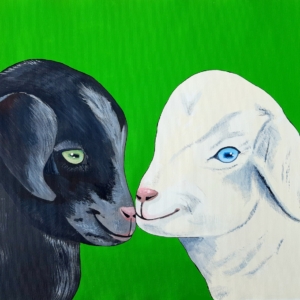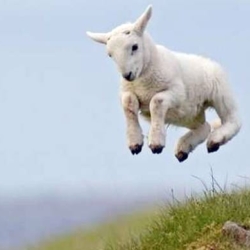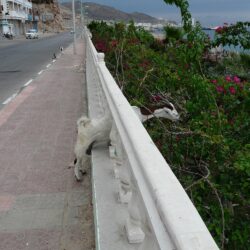| Source (Aramaic) | Translation (Papiamento) | Translation (Judeo-Papiamento) | Translation (English) |
|---|---|---|---|
חַד גַּדְיָא, חַד גַּדְיָא. דְּזַבִּן אַבָּא בִּתְרֵי זוּזֵי, חַד גַּדְיָא, חַד גַּדְיָא. |
Un kabritu, un kabritu ku mi tata a kumprá pa dos florin, un kabritu, un kabritu. |
אוע קַאברִיטו, אוע קַאברִיטו קו מִי טַאטַה אַה קומפרַה פַה דוֹס פﬞלוֹרִיע, אוע קַאברִיטו, אוע קַאברִיטו |
One little goat, one little goat that my father bought for two zuzim. One little goat, one little goat. |
וְאָתָא שֻׁנְרָא וְאָכְלָה לְגַדְיָא, דְּזַבִּן אַבָּא בִּתְרֵי זוּזֵי, חַד גַּדְיָא, חַד גַּדְיָא. |
Awor e pushi a bin, i a kome e kabritu, ku mi tata a kumprá pa dos florin, un kabritu, un kabritu. |
אַווֹר אֵי פושִﬞי אַה בִיע, אִי אַה קוֹמֵי אֵי קַאברִיטו, קו מִי טַאטַה אַה קומפרַה פַה דוֹס פﬞלוֹרִיע, אוע קַאברִיטו, אוע קַאברִיטו |
A cat came and ate the goat that my father bought for two zuzim. One little goat, one little goat. |
וְאָתָא כַּלְבָּא וְנָשַׁךְ לְשֻׁנְרָא, דְּאָכְלָה לְגַדְיָא, דְּזַבִּן אַבָּא בִּתְרֵי זוּזֵי, חַד גַּדְיָא, חַד גַּדְיָא. |
Awor e kachó a bin, i a kou e pushi, ku a kome e kabritu, ku mi tata a kumprá pa dos florin, un kabritu, un kabritu. |
אַווֹר אֵי קַגﬞוֹ אַה בִיע, אִי אַה קַוֹו אֵי פושִﬞי, קו אַה קוֹמֵי אֵי קַאברִיטו, קו מִי טַאטַה אַה קומפרַה פַה דוֹס פﬞלוֹרִיע, אוע קַאברִיטו, אוע קַאברִיטו |
A dog came and bit the cat that ate the goat that my father bought for two zuzim. One little goat, one little goat. |
וְאָתָא חֻטְרָא וְהִכָּה לְכַלְבָּא, דְּנָשַׁךְ לְשֻׁנְרָא, דְּאָכְלָה לְגַדְיָא, דְּזַבִּן אַבָּא בִּתְרֵי זוּזֵי, חַד גַּדְיָא, חַד גַּדְיָא. |
Awor e palu a bin, i a dal e kachó, ku a kou e pushi, ku a kome e kabritu, ku mi tata a kumprá pa dos florin, un kabritu, un kabritu. |
אַווֹר אֵי פַאלוּ אַה בִיע, אִי אַה דַאל אֵי קַאגﬞוֹ, קו אַה קַוֹו אֵי פושִﬞי, קו אַה קוֹמֵי אֵי קַאברִיטו, קו מִי טַאטַה אַה קומפרַה פַה דוֹס פﬞלוֹרִיע, אוע קַאברִיטו, אוע קַאברִיטו |
A stick came and hit the dog that bit the cat that ate the goat that my father bought for two zuzim. One little goat, one little goat. |
וְאָתָא נוּרָא וְשָׂרַף לְחֻטְרָא, דְּהִכָּה לְכַלְבָּא, דְּנָשַׁךְ לְשֻׁנְרָא, דְּאָכְלָה לְגַדְיָא, דְּזַבִּן אַבָּא בִּתְרֵי זוּזֵי, חַד גַּדְיָא, חַד גַּדְיָא. |
Awor e kandela a bin, i a kimá e palu, ku a dal e kachó, ku a kou e pushi, ku a kome e kabritu, ku mi tata a kumprá pa dos florin, un kabritu, un kabritu. |
אַווֹר אֵי קַאנדֵילַה אַה בִיע, אִי אַה קִימַה אֵי פַאלו, קו אַה דַאל אֵי קַאגﬞוֹ, קו אַה קַוֹו אֵי פושִﬞי, קו אַה קוֹמֵי אֵי קַאברִיטו, קו מִי טַאטַה אַה קומפרַה פַה דוֹס פﬞלוֹרִיע, אוע קַאברִיטו, אוע קַאברִיטו |
A fire came and burned the stick that hit the dog that bit the cat that ate the goat that my father bought for two zuzim. One little goat, one little goat. |
וְאָתָא מַיָּא וְכָבָה לְנוּרָא, דְּשָׂרַף לְחֻטְרָא, דְּהִכָּה לְכַלְבָּא, דְּנָשַׁךְ לְשֻׁנְרָא, דְּאָכְלָה לְגַדְיָא, דְּזַבִּן אַבָּא בִּתְרֵי זוּזֵי, חַד גַּדְיָא, חַד גַּדְיָא. |
Awor e awa a bin, i a paga e kandela, ku a kimá e palu, ku a dal e kachó, ku a kou e pushi, ku a kome e kabritu, ku mi tata a kumprá pa dos florin, un kabritu, un kabritu. |
אַווֹר אֵי אַוַה אַה בִיע,. אִי אַה פַאגַה אֵי קַאנדֵילַה, קו אַה קִימַה אֵי פַאלו, קו אַה דַאל אֵי קַאגﬞוֹ, קו אַה קַוֹו אֵי פושִﬞי, קו אַה קוֹמֵי אֵי קַאברִיטו, קו מִי טַאטַה אַה קומפרַה פַה דוֹס פﬞלוֹרִיע, אוע קַאברִיטו, אוע קַאברִיטו |
Water came and put out the fire that burned the stick that hit the dog that bit the cat that ate the goat that my father bought for two zuzim. One little goat, one little goat. |
וְאָתָא תּוֹרָא וְשָׁתָא לְמַיָּא, דְּכָבָה לְנוּרָא, דְּשָׂרַף לְחֻטְרָא, דְּהִכָּה לְכַלְבָּא, דְּנָשַׁךְ לְשֻׁנְרָא, דְּאָכְלָה לְגַדְיָא, דְּזַבִּן אַבָּא בִּתְרֵי זוּזֵי, חַד גַּדְיָא, חַד גַּדְיָא. |
Awor e bue a bin, i a bebe e awa, ku a paga e kandela, ku a kimá e palu, ku a dal e kachó, ku a kou e pushi, ku a kome e kabritu, ku mi tata a kumprá pa dos florin, un kabritu, un kabritu. |
אַווֹר אֵי בוֵי אַה בִיע, אִי אַה בֵיבֵי אֵי אַוַה, קו פַאגַה אֵי קַאנדֵילַה, קו אַה קִימַה אֵי פַאלו, קו אַה דַאל אֵי קַאגﬞוֹ, קו אַה קַוֹו אֵי פושִﬞי, קו אַה קוֹמֵי אֵי קַאברִיטו, קו מִי טַאטַה אַה קומפרַה פַה דוֹס פﬞלוֹרִיע, אוע קַאברִיטו, אוע קַאברִיטו |
An ox came and drank the water that put out the fire that burned the stick that hit the dog that bit the cat that ate the goat that my father bought for two zuzim. One little goat, one little goat. |
וְאָתָא הַשּׁוֹחֵט וְשָׁחַט לְתוֹרָא, דְּשָׁתָא לְמַיָּא, דְּכָבָה לְנוּרָא, דְּשָׂרַף לְחֻטְרָא, דְּהִכָּה לְכַלְבָּא, דְּנָשַׁךְ לְשֻׁנְרָא, דְּאָכְלָה לְגַדְיָא, דְּזַבִּן אַבָּא בִּתְרֵי זוּזֵי, חַד גַּדְיָא, חַד גַּדְיָא. |
Awor e karniseru a bin, i a matá e bue, ku a bebe e awa, ku a paga e kandela, ku a kimá e palu, ku a dal e kachó, ku a kou e pushi, ku a kome e kabritu, ku mi tata a kumprá pa dos florin, un kabritu, un kabritu. |
אַווֹר אֵי קַארנִיסֵירו אַה בִיע, אִי אַה מַאטַה אֵי בוֵי קו אַה בֵיבֵי אֵי אַוַה, קו פַאגַה אֵי קַאנדֵילַה, קו אַה קִימַה אֵי פַאלו, קו אַה דַאל אֵי קַאגﬞוֹ, קו אַה קַוֹו אֵי פושִﬞי, קו אַה קוֹמֵי אֵי קַאברִיטו, קו מִי טַאטַה אַה קומפרַה פַה דוֹס פﬞלוֹרִיע, אוע קַאברִיטו, אוע קַאברִיטו |
A butcher came and slaughtered the ox that drank the water that put out the fire that burned the stick that hit the dog that bit the cat that ate the goat that my father bought for two zuzim. One little goat, one little goat. |
וְאָתָא מַלְאַךְ־הַמָּ֫וֶת דְּשָׁחַט לְשׁוֹחֵט, דְּשָׁחַט לְתוֹרָא, דְּשָׁתָא לְמַיָּא, דְּכָבָה לְנוּרָא, דְּשָׂרַף לְחֻטְרָא, דְּהִכָּה לְכַלְבָּא, דְּנָשַׁךְ לְשֻׁנְרָא, דְּאָכְלָה לְגַדְיָא, דְּזַבִּן אַבָּא בִּתְרֵי זוּזֵי, חַד גַּדְיָא, חַד גַּדְיָא. |
Awor e angel di morto a bin, i a matá e karniseru, ku a matá e bue, ku a bebe e awa, ku a paga e kandela, ku a kimá e palu, ku a dal e kachó, ku a kou e pushi, ku a kome e kabritu, ku mi tata a kumprá pa dos florin, un kabritu, un kabritu. |
אַווֹר אֵי אַנחֵיל דִי מוֹרטוֹ אַה בִיע, אִי אַה מַאטַה אֵי קַארנִיסֵירו, קו אַה מַאטַה אֵי בוֵי קו אַה בֵיבֵי אֵי אַוַה, קו פַאגַה אֵי קַאנדֵילַה, קו אַה קִימַה אֵי פַאלו, קו אַה דַאל אֵי קַאגﬞוֹ, קו אַה קַוֹו אֵי פושִﬞי, קו אַה קוֹמֵי אֵי קַאברִיטו, קו מִי טַאטַה אַה קומפרַה פַה דוֹס פﬞלוֹרִיע, אוע קַאברִיטו, אוע קַאברִיטו |
The Angel of Death came and slaughtered the shoḥet who slaughtered the ox that drank the water that put out the fire that burned the stick that hit the dog that bit the cat that ate the goat that my father bought for two zuzim. One little goat, one little goat. |
וְאָתָא הַקָּדוֹשׁ־בָּרוּךְ־הוּא וְשָׁחַט לְמַלְאַךְ־הַמָּ֫וֶת וְשָׁחַט לְשׁוֹחֵט, דְּשָׁחַט לְתוֹרָא, דְּשָׁתָא לְמַיָּא, דְּכָבָה לְנוּרָא, דְּשָׂרַף לְחֻטְרָא, דְּהִכָּה לְכַלְבָּא, דְּנָשַׁךְ לְשֻׁנְרָא, דְּאָכְלָה לְגַדְיָא, דְּזַבִּן אַבָּא בִּתְרֵי זוּזֵי, חַד גַּדְיָא, חַד גַּדְיָא. |
Awor e Santu sea bendishoná a bin, i a matá e angel di morto, ku a matá e karniseru, ku a matá e bue, ku a bebe e awa, ku a paga e kandela, ku a kimá e palu, ku a dal e kachó, ku a kou e pushi, ku a kome e kabritu, ku mi tata a kumprá pa dos florin, un kabritu, un kabritu. |
אַווֹר אֵי סַאנטו סֵיאַה בֵינדִישﬞוֹנַה אַה בִיע, אִי אַה מַאטַה אֵי אַנחֵיל דִי מוֹרטוֹ, קו אַה מַאטַה אֵי קַארנִיסֵירו, קו אַה מַאטַה אֵי בוֵי קו אַה בֵיבֵי אֵי אַוַה, קו פַאגַה אֵי קַאנדֵילַה, קו אַה קִימַה אֵי פַאלו, קו אַה דַאל אֵי קַאגﬞוֹ, קו אַה קַוֹו אֵי פושִﬞי, קו אַה קוֹמֵי אֵי קַאברִיטו, קו מִי טַאטַה אַה קומפרַה פַה דוֹס פﬞלוֹרִיע, אוע קַאברִיטו, אוע קַאברִיטו |
Then the blessed Holy One came and slaughtered the Angel of Death who slaughtered the shoḥet who slaughtered the ox that drank the water that put out the fire that burned the stick that hit the dog that bit the cat that ate the goat that my father bought for two zuzim. One little goat, one little goat. |
This is a translation of Ḥad Gadya into Papiamento by Isaac Gantwerk Mayer. Papiamentu is the local Creole langugage of Curaçao, home to the oldest Jewish community west of the Atlantic ocean. The Solitreo font used here was produced by Nathan Gross and Bryan Kirschen for the Documenting Judeo-Spanish Project.
The earliest known appearance of “Ḥad Gadya,” by an unknown author, can be found, handwritten, in the Prague Haggadah (1526). The Aramaic has been vocalized according to the Prague Haggadah (1590). Besides the transcription of the Aramaic with its vocalization, I have also added a translation adapted from Eve Levavi Feinstein’s Passover Haggadah translation. –Aharon N. Varady
Click to access Neo-Solitreo-Orthography-for-Papiamentu-Isaac-Gantwerk-Mayer-2023.pdf

“חַד גַּדְיָא | Un Kabritu (אוע קַאברִיטו) — a Papiamentu translation of Ḥad Gadya by Isaac Gantwerk Mayer” is shared through the Open Siddur Project with a Creative Commons Attribution-ShareAlike 4.0 International copyleft license.






!["Some of the Farmer's Goats" [in Gondar, Ethiopia] (credit: Den Merino, license: CC BY-ND)](https://opensiddur.org/wp-content/uploads/2024/02/Some-of-the-Farmers-Goats-Den-Merino-CC-BY-ND-250x250.jpg)



Leave a Reply